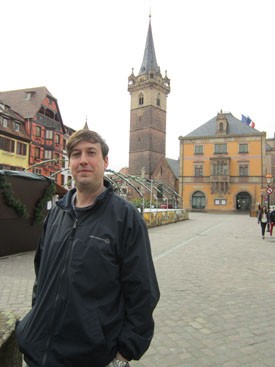
UC Fulbright Scholar Studies Emigration from Disputed Region Alternately Claimed by France and Germany
A 2012-2013 Fulbright Scholar Grant is enabling University of Cincinnati Professor Timothy Forest of UC Blue Ash College to travel to and live in Strasbourg, France, in order to study emigration from the region of Alsace-Lorraine, a territory that often changed hands between France and Germany in both the 19th and 20th centuries.
In Strasbourg, the capital of the region, Forest has access to several libraries and archives that house original, unpublished documents, letters as well as books related to his study of French emigrants from Alsace-Lorraine.
The region was part of France until its annexation by Germany in the 19th century following the Franco-Prussian War. It became French again after World War I; was administered as German territory by Germany during World War II, and reverted to French sovereignty in 1945.
The German heritage of the region is reflected in the food. A traditional Alsatian meal would probably remind many in Cincinnati of the food they can get at the Hofbrauhaus or any other German restaurant at home, said Forest.
Another indicator of that mixed cultural heritage is the beer: Alsace is where most French beer is made, again reflecting a German influence.
Forests research concentrates on a related, but different aspect of Alsatian history. Inhabitants of this region were more likely to resettle in different parts of the world than their fellow French.
Forest is looking at attempts by the French government to make use of this willingness to emigrate to encourage residents to resettle in Algeria in order to boost the French population there and thus, help develop an important territory. Explains Forest, Unlike most of its overseas possessions, France always considered Algeria to be part of France, hence the need to make it more French. With a large Arab population and with most whites in Algeria being Spanish, Italian or Maltese, the French Government hoped to keep the Alsatians who were leaving within their empire by sending them to Algeria and setting them up on farms there.
Yet, the Alsatians seem to have been less interested in resettling in Algeria, even though the government offered free farms. Instead, émigrés from the region seemingly preferred the United States, specifically Texas, whose government also wanted to establish a colony for the Alsatians in the nineteenth century, one that was in the long run more successful than the ones in Algeria.
Forest is planning a book on the topic: It will be on the experience of French emigrants, both within the French Empire and the U.S. This is a woefully understudied field.
The Fulbright Scholar Program has provided key support in making his stay and his studies successful. The Fulbright Commission in France, or more correctly the Franco-American Commission that administers the grant, has been nothing short of outstanding, said Forest. They help with finding places to live, establishing contacts with French academics, dealing with immigration, finding doctors and more. We even got to meet Jill Biden, who loved the fact that I live in Ohio!
While happy for the study opportunities in France, Forest said he also misses Cincinnati. Going to a Reds game or even watching baseball on TV is not possible in Europe. I love UC and Cincinnati as a whole. Its hard to be away, said Forest, who was born and raised in the New York City area.
He will leave France in August after eight months of research. When back in Cincinnati, he will probably miss certain aspects of life in France: I really enjoy the food and drink and the mass transit. I also enjoy the fact that there are so many different languages and cultures within a three hour trip from Strasbourg.
As travel is a big part of historical research, he will likely return some day. In the meantime, he will focus on finishing his book about the Europeans who were alternately German or French and thus decided to settle that question by emigrating.
Tags
Related Stories
LINK nky: Kentucky cities consider medical marijuana regulations
May 7, 2024
With medical marijuana set to become legal in Kentucky in 2025, cities in Kenton County have to decide whether they’ll allow medical cannabis businesses to operate in their jurisdictions, LINK nky reported.
Local news highlights UC's artificial intelligence programs
May 6, 2024
UC College of Engineering and Applied Science Professor Ali Minai tells WLWT and WVXU that AI is becoming a popular subject among new students.
Information Security Roadshow spreads awareness
May 3, 2024
The University of Cincinnati's Office of Information Security launched a series of 18 in-person sessions from January to April 2024, drawing nearly 350 attendees from the staff of various UC colleges and units. The Information Security Roadshow series aimed to equip the audience with knowledge on prevailing cyber threats, prevention strategies, how to report incidents and resources to stay informed and secure.
